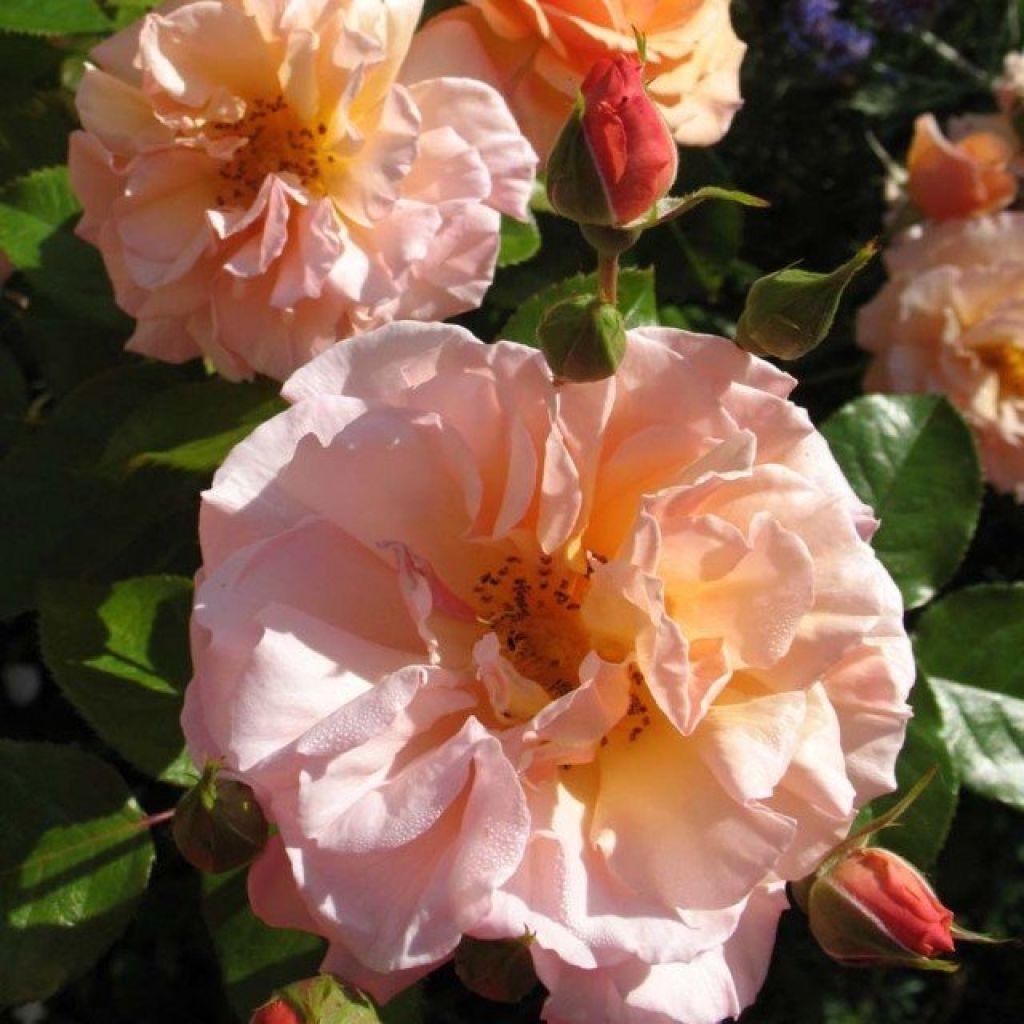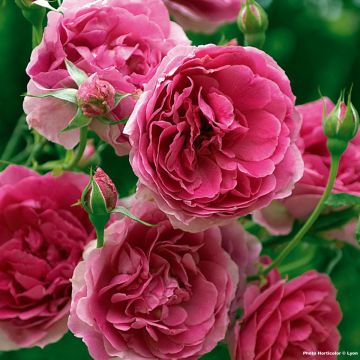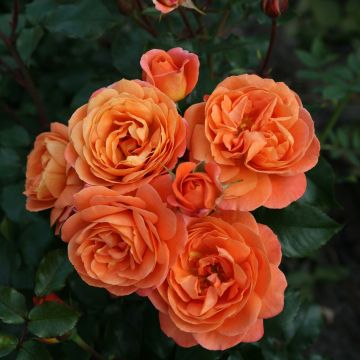

Rosa x floribunda 'Martin des Senteurs' - Standard Rose
Rosa x floribunda 'Martin des Senteurs' - Standard Rose
Rosa x floribunda Martin des Senteurs ® Adabaluc
Floribunda Rose
Special offer!
Receive a €20 voucher for any order over €90 (excluding delivery costs, credit notes, and plastic-free options)!
1- Add your favorite plants to your cart.
2- Once you have reached €90, confirm your order (you can even choose the delivery date!).
3- As soon as your order is shipped, you will receive an email containing your voucher code, valid for 3 months (90 days).
Your voucher is unique and can only be used once, for any order with a minimum value of €20, excluding delivery costs.
Can be combined with other current offers, non-divisible and non-refundable.
Home or relay delivery (depending on size and destination)
Schedule delivery date,
and select date in basket
This plant carries a 6 months recovery warranty
More information
We guarantee the quality of our plants for a full growing cycle, and will replace at our expense any plant that fails to recover under normal climatic and planting conditions.
Description
The 'Martin des Senteurs' standard rose possesses the same qualities as the bush, adding a beautiful silhouette of a small tree with a large crown. Highly fragrant, it is also extremely floriferous and highly recurrent. It produces generous bouquets of double flowers in a vivid salmon pink that evolves towards a chamois apricot while diffusing a beautiful, unique, sweet fragrance. Its abundant foliage, of a beautiful lustrous purple-green, is free from diseases. Not very bulky, it is easy to slip into small spaces. Place it prominently near a thoroughfare or in a large pot to perfume the terrace!
Standard roses are created by grafting a specific variety of rose, such as the Martin des Senteurs bush rose, onto a different rose's upright stem, which could be Rosa canina, R. laxa or R. multiflora. The graft is made at a certain height, usually at 50-60 cm (20-24 inches) above the ground. In regions with extremely cold weather, it might be necessary to protect the rootstock during winter.
The 'Martin des Senteurs' or 'Adabaluc' rose is a beautiful French creation by Michel Adam, dating back to 1998. This variety belongs to the floribunda rose family. Grafted onto a stem, it has a characteristic habit, with a slender and upright "trunk" topped with a ramified and compact crown. Its thorny stems bear glossy foliage, emerging red and becoming dark green in summer while retaining a purple margin. Its flowering is abundant from May-June until October-November if it is regularly pruned and provided with water. The flowers are gathered in large bouquets with a diameter of 25 cm (10in); they are double, about 6-7 cm (2-3in) wide, and composed of around 30 petals. The tightly closed dark pink buds open into beautifully turbinate flowers of a very beautiful salmon orange, soft and bright. They gradually open into well-opened cups while fading and taking on more yellow chamois shades, revealing a small heart of yellow stamens. The fragrance of this rose is pronounced, rich in aromas of exotic fruits, with a lemony touch.
This 'Martin des Senteurs' Standard rose is ideal in the center of a bed of light perennials, along a path, near the terrace, isolated in a small well-kept garden or in a large pot on the balcony. Its vigor, fragrance, floribundity, and resistance make it a top-notch variety for all gardens, even small ones. Depending on the desires of each gardener, it can be paired with small white roses (Marie Pavie, Swanny), or with a bit of audacity, mauve roses (Blue Boy, Rhapsody in Blue, Roman Waltz). It also blends with easy-to-grow perennials such as perennial geraniums, catmints, bellflowers, or asters. And its roses are so fragrant and warm in bouquets!
Report an error about the product description
Plant habit
Flowering
Foliage
Botanical data
Rosa
x floribunda
Martin des Senteurs ® Adabaluc
Rosaceae
Floribunda Rose
Cultivar or hybrid
Planting and care
Rose bushes need sunlight for 4-5 hours daily, but protecting them from the strong sun and wind is best. They grow best in loose, permeable soil that is rich in humus. The soil should be well-cultivated and rich enough, but they can also grow in any soil.
If you're planting them in a pot, loosen the soil to a depth of 10 inches and add a base amendment like blood, fish and bone at the bottom of the planting hole. Position the plant and cover the top of the root ball with 1 inch of soil. Fill in the hole, press down the soil, and water generously to eliminate air pockets. Water regularly during dry weather for a few weeks to help the roots develop. Use special rose fertilisers to promote flowering.
In areas with harsh winters, covering the grafting branch of standard roses (also known as the "trunk") with a thick winter veil is recommended to protect it.
Roses may develop unsightly spots at the end of summer, but this is a natural occurrence and doesn't harm the rose's growth.
Planting period
Intended location
Care
This item has not been reviewed yet - be the first to leave a review about it.
Similar products
Haven't found what you were looking for?
Hardiness is the lowest winter temperature a plant can endure without suffering serious damage or even dying. However, hardiness is affected by location (a sheltered area, such as a patio), protection (winter cover) and soil type (hardiness is improved by well-drained soil).

Photo Sharing Terms & Conditions
In order to encourage gardeners to interact and share their experiences, Promesse de fleurs offers various media enabling content to be uploaded onto its Site - in particular via the ‘Photo sharing’ module.
The User agrees to refrain from:
- Posting any content that is illegal, prejudicial, insulting, racist, inciteful to hatred, revisionist, contrary to public decency, that infringes on privacy or on the privacy rights of third parties, in particular the publicity rights of persons and goods, intellectual property rights, or the right to privacy.
- Submitting content on behalf of a third party;
- Impersonate the identity of a third party and/or publish any personal information about a third party;
In general, the User undertakes to refrain from any unethical behaviour.
All Content (in particular text, comments, files, images, photos, videos, creative works, etc.), which may be subject to property or intellectual property rights, image or other private rights, shall remain the property of the User, subject to the limited rights granted by the terms of the licence granted by Promesse de fleurs as stated below. Users are at liberty to publish or not to publish such Content on the Site, notably via the ‘Photo Sharing’ facility, and accept that this Content shall be made public and freely accessible, notably on the Internet.
Users further acknowledge, undertake to have ,and guarantee that they hold all necessary rights and permissions to publish such material on the Site, in particular with regard to the legislation in force pertaining to any privacy, property, intellectual property, image, or contractual rights, or rights of any other nature. By publishing such Content on the Site, Users acknowledge accepting full liability as publishers of the Content within the meaning of the law, and grant Promesse de fleurs, free of charge, an inclusive, worldwide licence for the said Content for the entire duration of its publication, including all reproduction, representation, up/downloading, displaying, performing, transmission, and storage rights.
Users also grant permission for their name to be linked to the Content and accept that this link may not always be made available.
By engaging in posting material, Users consent to their Content becoming automatically accessible on the Internet, in particular on other sites and/or blogs and/or web pages of the Promesse de fleurs site, including in particular social pages and the Promesse de fleurs catalogue.
Users may secure the removal of entrusted content free of charge by issuing a simple request via our contact form.
The flowering period indicated on our website applies to countries and regions located in USDA zone 8 (France, the United Kingdom, Ireland, the Netherlands, etc.)
It will vary according to where you live:
- In zones 9 to 10 (Italy, Spain, Greece, etc.), flowering will occur about 2 to 4 weeks earlier.
- In zones 6 to 7 (Germany, Poland, Slovenia, and lower mountainous regions), flowering will be delayed by 2 to 3 weeks.
- In zone 5 (Central Europe, Scandinavia), blooming will be delayed by 3 to 5 weeks.
In temperate climates, pruning of spring-flowering shrubs (forsythia, spireas, etc.) should be done just after flowering.
Pruning of summer-flowering shrubs (Indian Lilac, Perovskia, etc.) can be done in winter or spring.
In cold regions as well as with frost-sensitive plants, avoid pruning too early when severe frosts may still occur.
The planting period indicated on our website applies to countries and regions located in USDA zone 8 (France, United Kingdom, Ireland, Netherlands).
It will vary according to where you live:
- In Mediterranean zones (Marseille, Madrid, Milan, etc.), autumn and winter are the best planting periods.
- In continental zones (Strasbourg, Munich, Vienna, etc.), delay planting by 2 to 3 weeks in spring and bring it forward by 2 to 4 weeks in autumn.
- In mountainous regions (the Alps, Pyrenees, Carpathians, etc.), it is best to plant in late spring (May-June) or late summer (August-September).
The harvesting period indicated on our website applies to countries and regions in USDA zone 8 (France, England, Ireland, the Netherlands).
In colder areas (Scandinavia, Poland, Austria...) fruit and vegetable harvests are likely to be delayed by 3-4 weeks.
In warmer areas (Italy, Spain, Greece, etc.), harvesting will probably take place earlier, depending on weather conditions.
The sowing periods indicated on our website apply to countries and regions within USDA Zone 8 (France, UK, Ireland, Netherlands).
In colder areas (Scandinavia, Poland, Austria...), delay any outdoor sowing by 3-4 weeks, or sow under glass.
In warmer climes (Italy, Spain, Greece, etc.), bring outdoor sowing forward by a few weeks.





































